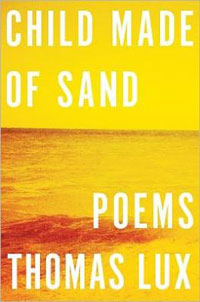Review of Thomas Lux’s Poetry Collection Child Made of Sand
Humorous Poems for Poets and Everyone Else
Despite its rather portentous title, Thomas Lux’s new collection of poems is — dare I say it? — fun. Yes, Child Made of Sand (Houghton Mifflin Harcourt, $23) discusses questions of ontology and epistemology and theology, it and it alludes to a slew of poets: Villon, Wordsworth, Keats, de Nerval, Frost, Mandelstam, Vallejo, and I’ve probably missed a few. There is even a poem about Nietzsche, but the title of that poem says everything about Lux’s attitude toward the great Western Tradition: “Nietzsche Throws His Arms Around the Neck of a Dray Horse.” The history of arts and letters is a goldmine for poetry, Lux suggests, just don’t forget to bring your sense of humor.

The poem about Wordsworth is entitled “A Delivery of Dung,” and is, initially at least, about the mid-composition interruption of Wordsworth’s poem “Intimations of Immortality” by a “timely wagonload” of manure. Of course, Coleridge famously claimed to have stopped writing “Kubla Khan” partway through when he was disturbed by a visit from a “person on business from Porlock.” The fact that Wordsworth carried on writing even after the dung’s intrusion says something about Lux’s ambivalent attitude toward the making of art. He honors persistence like that displayed by the great Romantic poet, yet he acknowledges, “No piece of art is perfect.” The poem concludes: “It (art) [is] always changing; us, / not so much.”
Fanciful subjects abound. “The Anti-Lunarian League” is about a group of people who are “against” the moon: “we don’t like it up there, / always a threat to fall on us!” “Dendrochronologist Blues” is told from the perspective of someone whose job is to count tree-rings. “Penultimatum” is about the ultimatum before the ultimatum. “Outline for My Memoir” dismisses decades of the poet’s life in a few lines: “My thirties? Wore funny glasses. / (Maybe a two-sentence self-deprecatory joke.)” Possibly the best title is “Every Time Someone Masturbates God Kills a Kitten,” although “The Goldfish Room (Where the Cops Beat You in the Head with a Phonebook)” is surely a close second.
While the poems usually begin and end with a reference to their titles, where they go in the middle is anyone’s guess. Each image leads to something new, ideas morph with astonishing rapidity. Lux loves parentheses. In fact, this mark of punctuation signaling that a word or phrase is inessential is central to his aesthetic. A sentence may be grammatically complete without a parenthetical clause, but as far as Lux is concerned, it is not necessarily spiritually or intellectually or aesthetically complete. The many parentheses give the poems a feeling of improvisation, as though, for Lux, each digression is crucial, each afterthought too vital to leave out.
Overall, this is an invigorating performance, even when — or is it especially when? — the subjects are most grim. In “Ermine Noose,” for instance, he describes the luxuries the condemned rich can afford, then writes: “but when the floor door’s latch unsnaps / they drop / as sharply as anyone, / or more so: softer nooses tighten faster.” You can hear Lux’s famously precise ear at work in this passage: the quick rhyme of “floor” and “door’s,” the assonance of “latch” and “unsnaps,” and the alliteration of all those “s” sounds — I count seven in four short lines.
Of course, this technical wizardry largely flies beneath the radar because the poems themselves zoom by with such bravura. Child Made of Sand will delight poets, but it will also appeal to readers who wouldn’t normally pick up a book of poems. Why don’t people read poetry? I’m often asked. I don’t know. With books like this one around, they ought to.



